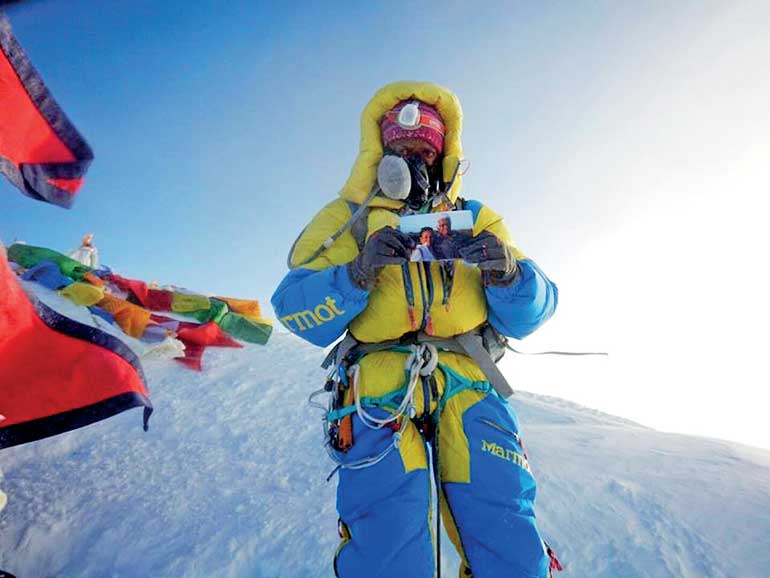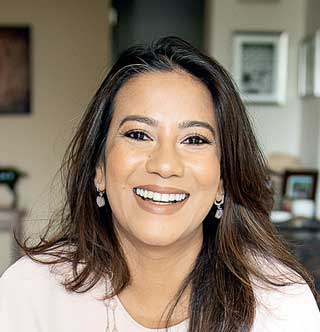Thursday Feb 19, 2026
Thursday Feb 19, 2026
Wednesday, 24 November 2021 00:00 - - {{hitsCtrl.values.hits}}

We see women atop mountains (pictured is Jayanthi Kuru-Utumpala, the first Sri Lankan to summit Mount Everest), in outer space and political spaces, in science and sports, on boards and the arts, in the fields and our homes. When we hear their stories, we realise we can take up space anywhere we want. Through their stories, we learn of their trials and tribulations, their triumphs and failures, their hopes and fears. We learn what it is like to navigate the world and what it is to be fully human
 By Dr. Mihirini de Zoysa
By Dr. Mihirini de Zoysa
When male meant human
The Harvard Adult Development study, initiated in 1938 and still continuing, is one of the longest development studies of its kind. The first batch of research subjects included, amongst the 268 sophomores, John F. Kennedy. Later 465 inner-city Bostonians were added.
What is striking, or not, given its time context, was that all the research subjects were male. Firstly, because at that time Harvard was an all-male university. Secondly, according to feminist researchers such as Carol Gilligan, development of males was equated to the development of all human beings until recently. For example, in psychoanalytical research, between Sigmund Freud and the child development research of Jean Piaget, when research outcomes differed for women and girls, it was sometimes treated as being a deviation from the norm—male.
Unsurprisingly, these same biases have been carried forward into leadership attributes deemed successful. Being relational and showing empathy, generally characterised as being too emotional, were attributed to women. Men who displayed such characteristics were derided for being girl-like. Being agentic, purely bottom-line based decision making, achieving goals at any cost was revered. It is only recently that relational skills, alongside Emotional Intelligence have been added to leadership competency models.
 The hidden stories of women
The hidden stories of women
For long women have been seeking success in a patriarchal world. However, often, these women’s lives have been ridiculed, forbidden, erased, ignored, or replaced. The world was shaped by men. War heroes are men. Industry leaders are men. Scientists are men. Artists are men. Religious leaders are men. God is a man.
Women were ‘mere’ (sic) child-bearers and homemakers. And ‘women’s work’ even now is not counted as ‘work’, because child-rearing and home keeping do not get counted in the GDP. What doesn’t get counted doesn’t count.
Even when women’s accomplishments in different fields are revealed from the shadows, they were couched in language that diminishes their worth. For example, when Dorothy Hodgkin, the British crystallographer who mapped the structure of penicillin, was awarded a Nobel Prize – its first and only British female recipient, in 1964, the press described it as ‘Oxford Housewife wins Nobel’.
Often, women laboured under a patriarchal system that they had to fight to be in, or were either ignored or obscured. Lisa Meitner’s ground-breaking discoveries, which led to the splitting of the atom, went uncredited, when her collaborator Otto Hahn published their work without her name. He went on to win the 1944 Nobel Prize in chemistry for ‘his’ (sic) contribution to nuclear fission.
Thankfully, this environment is changing. When researchers, writers and storytellers started listening to different voices and telling the stories of the other, the full, rich and complex experiences of being human were revealed, acknowledged and understood.
Women have been sharing their lives and stories throughout history, but generally with other women, in small and often private circles. The movie ‘How to make an American quilt’ is a poignant coming of age story about Finn, soon-to-be-wed, played by Wynona Ryder, and a group of women making a quilt as a wedding present. The women of all ages, trade stories as they weave themselves and their stories into the quilt. When the young bride goes to bed, she will be held warm by these women’s stories, and the advice and guidance lovingly stitched in will help her navigate her life and serve as a reminder of her female heritage, the lineage of strong, passionate, caring women she comes from.
But these stories we share with our mothers, sisters, daughters and friends, need to come out of the shadows of the close-knit circles, to be more widely shared, not just with women, but with men too.
Human beings are storied creatures
Stories help us shape the world as much as they shape us. We make sense of the world through the stories we tell and retell. Stories remind us that we are not alone. We connect when we recognise ourselves in the stories of each other. Stories embody both our unique and universal human experiences.
When stories are buried, erased, forbidden or ignored—they are no longer accepted, acknowledged and understood as part of the larger human experience. When almost half of the world’s stories of the other—women—are lost over centuries, we and our history is erased and denied. Our presence is relegated to the roles the patriarchy deemed important. We become irrelevant and is absent in the human experiences of being artists, writers, scientists, leaders, healers alongside being mothers, wives and homemakers. Our relational and emotional life is seen as a flaw rather than a strength. When we don’t have a reference point for ourselves, it is difficult to imagine our active presence in the future.
To be counted, women must share their stories and weave themselves into the fabric of the world. If we are to change the world, to inhabit this world and to flourish, as is the right of all human beings, we must share our stories.
Women’s stories paving the way for other women
Junko Tabeim was the first woman to complete the Seven Summits. She formed the Ladies Climbing Club in 1975, the first all-women mountaineering group to climb Everest, enabling a long line of Japanese women, who were primarily seen in the roles of wives and mothers, to imagine the impossible; to also be mountaineers. This included our very own Jayanthi Kuru-Utumpala, the first Sri Lankan to summit Everest. Today, because of her, little Sri Lankan girls (and boys) can imagine themselves conquering a landscape they would have only seen on TV.
As of 2021, 65 women have been in space. Valentina Tereshkova, a textile mill-worker, joined a parachuting club, and after 150 jumps applied to the Soviet Space centre. In 1961 she paved the way for other women to follow. We see women atop mountains, in outer space and political spaces, in science and sports, on boards and the arts, in the fields and our homes. When we hear their stories, we realise we can take up space anywhere we want. Through their stories, we learn of their trials and tribulations, their triumphs and failures, their hopes and fears. We learn what it is like to navigate the world and what it is to be fully human.
When we raise our voices and share stories of misogyny and abuse, movements like #MeToo give other women voices. A young woman, reading that the powerful Harvey Weinstein has been outed by women sharing their stories, might find the courage to out someone abusive in her workplace. Watching Jacinda Arden, lead New Zealand, the whole world sees the successes of leading with compassion, moral courage, decisiveness, political acumen alongside being a young mother, loving wife and strong and capable woman.
Raising our voices and telling our stories
Out stories and our lives, from literature to research, have for a long time been told by men. Women, fashioned in the ideal of man, were often given a life they didn’t have. Because women didn’t have access to reading, writing or education, we couldn’t lay claim to our reality, to our experiences, to speak of what was true for us, of our hopes and dreams for ourselves.
But we are fortunate to live in a time like never before, in terms of education, opportunities, career choices and access to platforms outside of our inner circles. We live in the age of social media, instant sharing and building of followership and platforms. We can not only tell our stories, we can now own our stories, unabashedly. We can share stories of the different roles we play, the challenges, successes, failures, and lessons learnt. We might be the road map for someone else.
And how can we do this?
Take up space: Many women, especially South Asian women have been brought up to be ‘nice girls’, women who demonstrate qualities of ‘Læjja-baya’, of showing socially approved modesty and restrain. Often, we make ourselves small and do not want to be seen as self-promoting. Be willing to take up space, be in your power and share the story of your journey.
Make space: When you create spaces, make sure you are making space for other women and other marginalised voices. Invite others to share their stories. Advocate and encourage. We can build ourselves only when we all rise together.
Find the nuggets of wisdom: Share what you have learnt along the way, and how it has changed you and your world. Your stories might be the inspiration and wisdom someone else is waiting for to embark on their journey.
Find your platform: Write, sing, dance or speak. From social media, to books, to magazines, on the stage or in a boardroom or a classroom, to networking events, to a gathering of friends, find your platform. If it is not available, build it!
Be consciously vulnerable: Sharing stories requires courage as stories reveal vulnerabilities and fallibilities. To be consciously vulnerable is to share your stories in safe spaces, with boundaries. Being tentative in sharing deeper parts of yourself is not being inauthentic. Grow into your stories, one step at a time, one word at a time. It is ok. Grow a thick skin: Realistically, being more public invites exposure. You will not be in full control of everyone’s reaction. Sometimes too much adulation or idolisation is as difficult as unfair judgement. So, accept all feedback with grace and grow a thicker skin.
Find your tribe: Find those who will cheer you on and encourage you. And be that to them too. It is with your tribe that you can be consciously vulnerable, share where you came from, who you are today, and what you dare to dream. Build your community.
Stories build community
Robert Waldinger, fourth director of the Harvard Adult Development Study, in a Ted talk in 2015 shared, that relationships are key to a good life. Social connections ensured that not only emotional and mental wellbeing, even physical wellbeing and mental agility improved and people fared better when they leaned into relationships, with family, friends and community.
This would not have surprised many women. We have always known that to be fully alive, and to love and be loved is an intrinsic part of a joyful life. And one of the ways to connect and relate is through stories. We build relationships and community only when we share and listen to each other’s stories. When women’s stories were hidden, not only our abilities or accomplishments, but what it is to live a relational, emotional and human life was largely ignored. But now we, not just women, but men, can reclaim our fully human lives.
Stories connect us and make us human. We learn from those who have gone before. And those who follow will learn from us. It is our legacy. Stories map roads taken and roads not to be taken. Stories also show us new roads we must build. We can change the world, one story at a time.
[The Women’s Chamber of Industry and Commerce (WCIC) is a premier non-profit organisation supporting women in entrepreneurs, professional businesswomen focused on developing, improving and strengthening the skills of women entrepreneurs. It is the first women only trade chamber to be set up in Sri Lanka in the year 1985. Its vision is to be the ‘think tank’ ‘voice’ and the ‘platform’ empowering women to be powerful nation builders by participating in transforming the economic growth of the nation. With a well-structured Board of Management and Pillar teams and Leaders with dedicated responsibility, the organisation focuses in achieving its detailed objectives with a clearly-defined strategic plan, as well as a plan for action. It has a growing membership and the membership is open to women who believe they can contribute to society as well as benefit from the many facilities the organisation creates. For further information on WCIC Contact: Janitha @ WCIC 0766837888.]